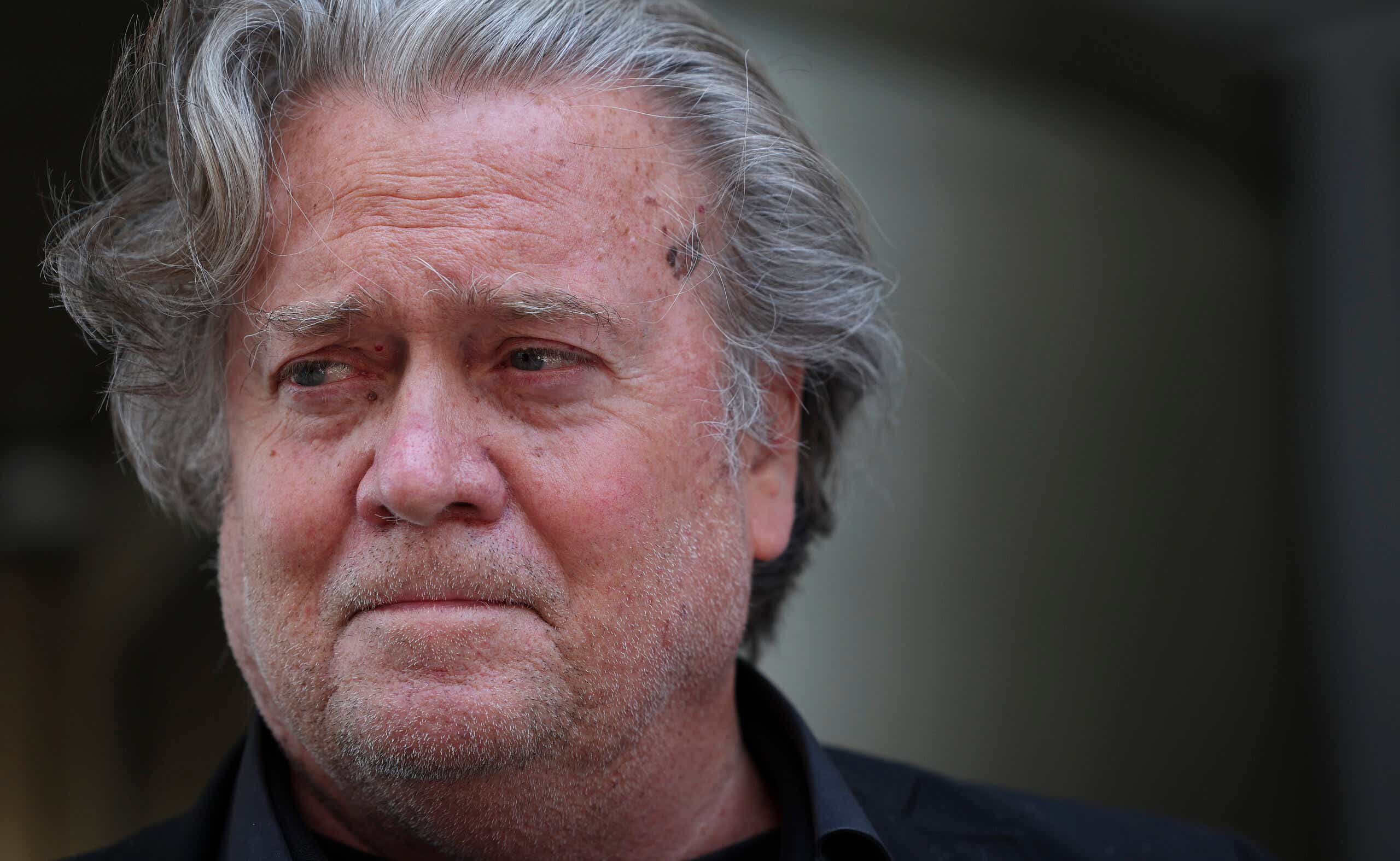Bannon has, until now, defied his subpoena.
Former Trump strategist Steve Bannon, who had a hand both in urging Congress to reject electoral votes inside the Capitol and in mobilizing the mob outside, has, until now, defied his subpoena from the Jan. 6 panel.
Now, with Bannon’s trial for contempt of Congress set to begin within weeks, Trump has waived his claim of executive privilege and encouraged him to testify. Here’s what this means.
What does Trump’s letter say?
“When you first received the Subpoena to testify and provide documents, I invoked Executive Privilege. However, I watched how unfairly you and others have been treated, having to spend vast amounts of money on legal fees, and all of the trauma you must be going through for the love of your Country, and out of respect for the Office of the President,” Trump wrote in a letter to Bannon on Saturday, which was obtained and reported by CNN.
“Therefore, if you reach an agreement on a time and place for your testimony, I will waive Executive Privilege for you, which allows you to go in and testify truthfully and fairly” Trump added, before denouncing the committee, who he described as “Thugs and Hacks.”
The combative tone of Trump’s letter strongly indicates he’s sending Bannon out to bat in his defense. It’s not clear what’s in it for Bannon, since this doesn’t serve as a remedy in the criminal trial for contempt of Congress he’s set to face later in July.
What was the deal with the privilege claim?
Bannon had invoked Trump’s claim of executive privilege not to appear before the panel — even though he wasn’t in government at the time of the attack, so federal prosecutors have pointed out that privilege didn’t apply anyway. Bannon resigned his White House job as chief strategist in 2017, years before the Capitol riot. Per CNN, legal experts say he had no authority to refuse the committee documents or testimony.
“Even if your client had been a senior aide to [Trump] during the time period covered by the contemplated testimony, which he was most assuredly not, he is not permitted by law to the type of immunity you suggest that Mr. Trump has requested he assert,” committee chair Bennie Thompson wrote to Bannon’s attorney in October.
The Guardian reports that the committee said Bannon could cite the privilege in response to some questions, but the overwhelming thrust of Bannon’s assertion of protection via Trump’s privilege claim doesn’t hold.
What is Bannon likely to tell the panel?
As The Washington Post notes, Bannon has previously denied culpability for the violence that occurred at the Capitol, even though he maintained critical communications with Trump in advance of the riot, and credits his podcast for rousing the “Stop The Steal” rally in Washington.
At the end of December 2020, Bannon told Trump to return to Washington from Mar-a-Lago and encouraged him to press Vice President Mike Pence to renounce the electoral college vote.
“We’re on the point of attack,” the far-right nationalist asserted on Jan. 5 on War Room, which is extremely popular, boasting tens of millions of downloads. “All hell will break loose tomorrow.”
He reinforced the message the following morning, as crowds gathered on the National Mall. “It’s them against us. Who can impose their will on the other side?” he asked.
After receiving his pardon from Trump for federal fraud, Bannon continued to push support for his ex-boss, declaring on his show in May 2021: “It’s going to be a fight, but this is a fight that must be won, we don’t have an option. We’re going to take this back village by village … precinct by precinct.”
His support for Trump has been so explicit that the panel doesn’t necessarily anticipate any fresh revelations from his testimony. “A lot of it is in plain sight,” one official on the committee told WashPo.
Much of what’s to come is still up in the air. It’s possible that Bannon will demand to testify on live TV, which the committee may be reluctant to agree to — or he may follow in the footsteps of former national security adviser Michael Flynn and former Justice Department official Jeffrey Clark, and claim his Fifth Amendment rights.
What about Bannon’s clemency?
Steve Bannon stood out among Trump’s supporters in the wake of the Capitol riot, as he was the only one who received clemency — though many joined the scramble to claim the election was void, and many high-profile figures, including Rudy Giuliani, as well as Trump’s family, didn’t receive preemptive pardons after the Capitol attack.
Bannon’s reprieve, which was one of Trump’s final acts as president, was in relation to a separate fraud case in which Bannon was accused of siphoning money away from the We Build The Wall fund. Federal prosecutors claimed that Bannon used a non-profit under his control to divert “over $1m from the … online campaign, at least some of which he used to cover hundreds of thousands of dollars in personal expenses.”
Though his clemency was unrelated to Jan. 6, a former senior administration official told the Washington Post that Bannon’s support for Trump in the wake of the election was a factor in his decision to grant clemency.









